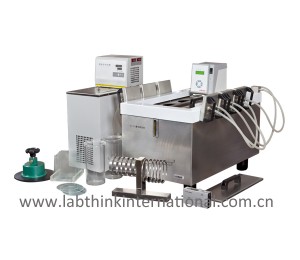Fogging Test SAE J1756, ISO 6452, DIN 75201
Materials used in vehicles, such as plastics, fabrics, rubber or leathers, will evaporate under high temperatures and condense on the windshield and create a fog, which causes dangerous driving conditions. Fogging test is right to measure fogging characteristics of these automotive interiors as well as HID lamps.
FT-F1 Fogging Tester is professionally designed for the fogging characteristics evaluation of volatile constituents of decorating materials used in cars and aircrafts, e.g. plastic articles, polyurethane, textiles, leather, adhesives, nonwovens and thermal forming elastomers at high temperature conditions. It also could be used for the fogging phenomenon test of high intensity discharge (HID) headlamps of cars.
Three test methods for inner materials of automotives
- Gloss Method
the specimen is heated in the beaker and its volatile constituents are condensed on the cooling glass plate. The fogging value could be obtained by calculating and comparing the gloss values occurred before and after condensation process.
- Haze Method
the specimen is heated in the beaker and its volatile constituents are condensed on the cooling glass plate. The fogging value of the specimen could be obtained by calculating and comparing the fogging values occurred before and after condensation process.
- Weighing Method
the specimen is heated in the beaker and its volatile constituents are condensed on the cooling aluminum foil. The fogging value – the weight of condensed constituents could be obtained by analyzing the weight changes of aluminum foil occurred before and after condensation process.




Could you please provide a quote for the ISO 6452 fogging testing equipment?
thanks
Steve Webb
919-995-5874
Please call if you have questions